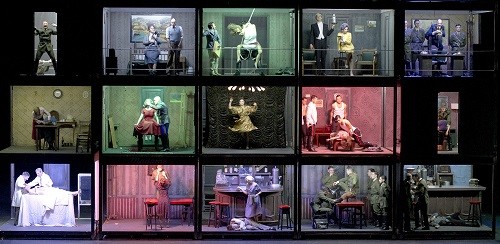 Argentina Zimmermann, Die Soldaten: Soloists and Orchestra. Conductor: Baldur Brönnimann, Teatro Colón, Buenos Aires. 19.7.2016. (JSJ)
Argentina Zimmermann, Die Soldaten: Soloists and Orchestra. Conductor: Baldur Brönnimann, Teatro Colón, Buenos Aires. 19.7.2016. (JSJ)

Cast:
Marie: Suzanne Elmark
Charlotte: Julia Riley
Condesa de la Roche: Noemi Nadelmann
Desportes: Ton Randle
Stolzius: Leigh Melrose
Wesener: Frode Olsen
El Joven Conde: Santiago Ballerini
Eisenhardt: Gustavo Gibert
Production:
Director: Pablo Maritano
Sets/lighting: Enrique Bordoloni
Costumes: Sofía Di Nunzio
Bernd Alois Zimmermann’s Die Soldaten (The Soldiers) is considered one of the more important works of the second half of the 20th century.
The composer’s only opera, it is based on the 1776 play of the same name by Jakob Michael Reinhold Lenz, in which the young woman, Marie, the daughter of a middle class merchant, meets her downfall at the hands of loosely moralled soldiers. Following the end of an affair with the officer Desportes, she undergoes degradations that result in her sinking into prostitution and life as a street beggar.
The work is both extremely complex and demanding to stage, requiring significant resources in the form of sixteen singing and ten speaking roles and a more than one hundred-piece orchestra, for which several of the boxes were taken over in addition to some players off-stage. A juxtaposition of scenes is another requirement.
In this the Latin American premiere of the opera, all of these requirements were well met in a comprehensive and rounded production that was as shocking to watch as to listen to – despite being over half a century on from its premiere.
In an interview in the hand programme, young Argentine producer Pablo Maritano outlined his perspective of the work as offering a pessimistic vision of humanity in a time in which present, past and future are one and the same. Abuse and violence are the forerunner of self-destruction, he says, commenting that he believes the soldiers Zimmermann writes about are not only military but encompass the sum of humanity’s moral mediocrities.
Violence, especially sexual violence, is presented prominently, with the scenic requirements met by Enrique Bordoloni with a three-storey structure with multiple cubicles that could also be adapted to different shapes. Indeed, at times there was almost too much simultaneous action in these adjacent cameos to fully take in. Dress by Sofía Di Nunzio was closer to Zimmermann’s time than Lenz’s.
Musically the work is of the 12-tone system and involves extensive use of percussion and such unusual features as banging chairs on the floor. Baldur Brönnimann apparently worked long and hard with the orchestra on the score and this showed in the precision that was apparent. Among the cast Suzanne Elmark was an intense Marie and Frode Olsen brought authority to the role of her father Wesener, while Tom Randle was notable as Desportes, but all coped well with the extreme demands of the music. Among the Argentines, particularly notable was Gustavo Gibert as the chaplain, Eisenhardt.
A number of people left in the interval between the second and third acts but there was enthusiastic applause at the end from those who remained.
Jonathan Spencer Jones
